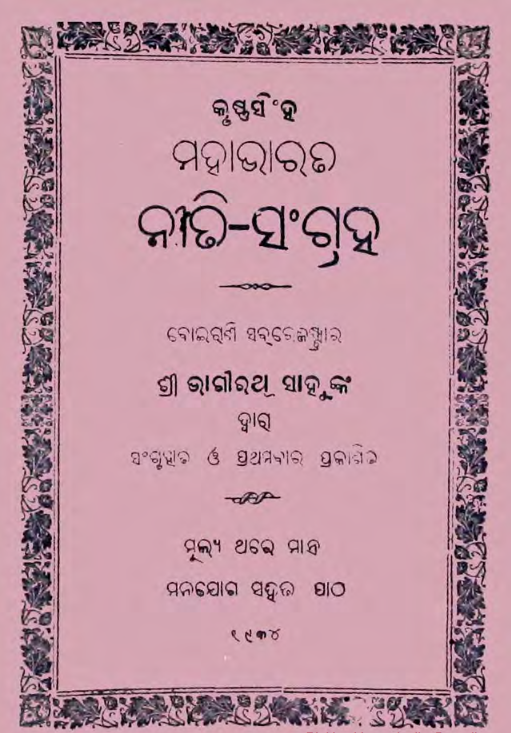Krusnasimha Mahabharata Niti-sangraha, edited by Bhagirathi Sahu and published in 1934, stands as a significant contribution to Odia literature, offering timeless insights into moral instruction rooted in the epic Mahabharata. This work provides readers with a collection of ethical teachings derived from the profound narratives and philosophical discourses found within the Mahabharata, framed through the lens of morality, ethics, and human conduct.
At its core, the Niti-sangraha serves as a guide for individuals seeking to navigate the complexities of life, highlighting principles that advocate righteousness and ethical behavior. Bhagirathi Sahu adeptly synthesizes various teachings, emphasizing the relevance of these moral lessons in contemporary society. The stories he draws upon are not mere historical or mythological accounts; they are reservoirs of wisdom that unveil the intricacies of human relationships, duty, and moral dilemmas.
The moral instruction presented in this compilation can be categorized into several key themes relevant for personal development and ethical living:
Dharma Righteousness: Central to the teachings in the Mahabharata is the concept of dharma. Sahu emphasizes the importance of adhering to one’s duties and responsibilities, which vary according to an individual’s role in society—be it as a family member, professional, or citizen. The book elucidates how the characters in the Mahabharata grapple with their dharma, showcasing that moral choices are often fraught with challenges.
The Consequences of Actions: Krusnasimha Mahabharata Niti-sangraha delves into the idea that every action has consequences, a principle epitomized by the karma philosophy. Through various narratives, readers are reminded that good deeds are rewarded, while wrongdoing ultimately leads to suffering.
The Value of Wisdom and Knowledge: Sahu underscores that true strength lies in wisdom. The book highlights stories of characters like Bhishma and Yudhishthira, who embody philosophical insight and demonstrate the importance of informed decision-making. The moral here is that knowledge empowers individuals to make choices that align with ethical principles.
Unity and Cooperation: The Mahabharata is punctuated with themes of unity and cooperation, especially in the context of the Kauravas and Pandavas. Sahu illuminates how discord can lead to downfall, and the value of collective effort and mutual respect in overcoming challenges.
Compassion and Empathy: The text advocates for compassion, urging readers to understand the perspectives and struggles of others. Acts of kindness are portrayed as essential to social harmony, reflecting the interconnectedness of humanity.
Books Info
| Books name | Krusnasimha Mahabharata Niti-sangraha / କୃଷ୍ଣସିଂହ ମହାଭାରତ ନୀତି -ସଂଗ୍ରହ |
| Author | Bhagirathi Sahu, Ed. |
| No Of pages | 98 |
| Publisher | NA |
| Publication | 1934 |
| Printed At | NA |
| Distributor | NA |

